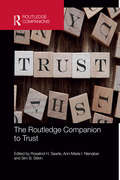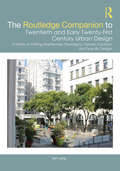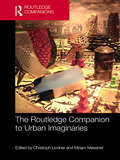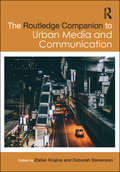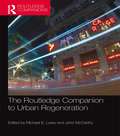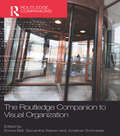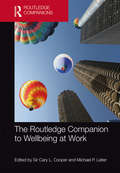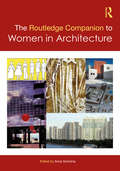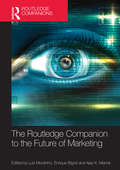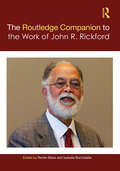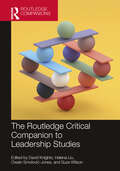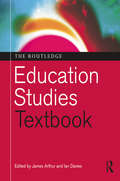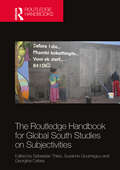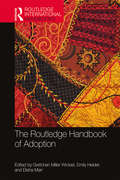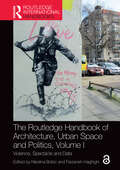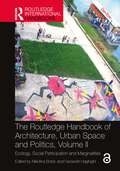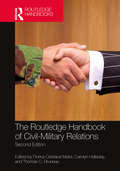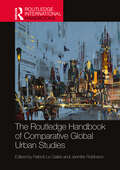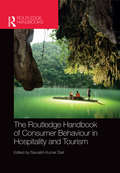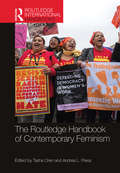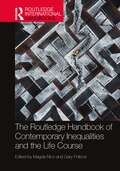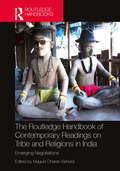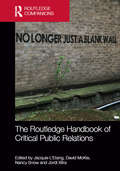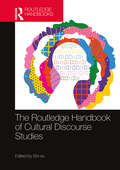- Table View
- List View
The Routledge Companion to Trust (Routledge Companions in Business, Management and Accounting)
by Sim B. Sitkin Rosalind H. Searle Ann-Marie I. NienaberIn recent years, trust has enjoyed increasing interest from a wide range of parties, including organizations, policymakers, and the media. Perennially linked to turbulence and scandals, the damaging and rebuilding of trust is a contemporary concern affecting all areas of society. Comprising six thematic sections, The Routledge Companion to Trust provides a comprehensive survey of trust research. With contributions from international experts, this volume examines the major topics and emerging areas within the field, including essays on the foundations, levels and theories of trust. It also examines trust repair and explores trust in settings such as healthcare, finance, food supply chains, and the internet. The Routledge Companion to Trust is an extensive reference work which will be a vital resource to researchers and practitioners across the fields of management and organizational studies, behavioural economics, psychology, cultural anthropology, political science and sociology.
The Routledge Companion to Twentieth and Early Twenty-First Century Urban Design: A History of Shifting Manifestoes, Paradigms, Generic Solutions, and Specific Designs (Routledge Companions)
by Jon LangThe Routledge Companion to Twentieth and Early Twenty-First Century Urban Design is a fully illustrated descriptive and explanatory history of the development of urban design ideas and paradigms of the past 150 years. The ideas and projects, hypothetical and built, range in scale from the city to the urban block level. The focus is on where the generic ideas originated, the projects that were designed following their precepts, the functions they address and/or afford, and what we can learn from them. The morphology of a city—its built environment—evolves unselfconsciously as private and governmental investors self-consciously erect buildings and infrastructure in a pragmatic, piecemeal manner to meet their own ends. Philosophers, novelists, architects, and social scientists have produced myriad ideas about the nature of the built environment that they consider to be superior to those forms resulting from a laissez-faire attitude to urban development. Rationalist theorists dream of ideal futures based on assumptions about what is good; empiricists draw inspirations from what they perceive to be working well in existing situations. Both groups have presented their advocacies in manifestoes and often in the form of generic solutions or illustrative designs. This book traces the history of these ideas and will become a standard reference for scholars and students interested in the history of urban spaces, including architects, planners, urban historians, urban geographers, and urban morphologists.
The Routledge Companion to Urban Imaginaries (Routledge International Handbooks)
by Christoph Lindner Miriam MeissnerThe Routledge Companion to Urban Imaginaries delves into examples of urban imaginaries across multiple media and geographies: from new visions of smart, eco, and resilient cities to urban dystopias in popular culture; from architectural renderings of starchitecture and luxury living to performative activism for new spatial justice; and from speculative experiments in urban planning, fiction, and photography to augmented urban realities in crowd-mapping and mobile apps. The volume brings various global perspectives together and into close dialogue to offer a broad, interdisciplinary, and critical overview of the current state of research on urban imaginaries. Questioning the politics of urban imagination, the companion gives particular attention to the role that urban imaginaries play in shaping the future of urban societies, communities, and built environments. Throughout the companion, issues of power, resistance, and uneven geographical development remain central. Adopting a transnational perspective, the volume challenges research on urban imaginaries from the perspective of globalization and postcolonial studies, inviting critical reconsiderations of urbanism in its diverse current forms and definitions. In the process, the companion explores issues of Western-centrism in urban research and design, and accommodates current attempts to radically rethink urban form and experience. This is an essential resource for scholars and graduate researchers in the fields of urban planning and architecture; art, media, and cultural studies; film, visual, and literary studies; sociology and political science; geography; and anthropology.
The Routledge Companion to Urban Media and Communication
by Deborah Stevenson Zlatan KrajinaThe Routledge Companion to Urban Media and Communication traces central debates within the burgeoning interdisciplinary research on mediated cities and urban communication. The volume brings together diverse perspectives and global case studies to map key areas of research within media, cultural and urban studies, where a joint focus on communications and cities has made important innovations in how we understand urban space, technology, identity and community. Exploring the rise and growing complexity of urban media and communication as the next key theme for both urban and media studies, the book gathers and reviews fast-developing knowledge on specific emergent phenomena such as: reading the city as symbol and text; understanding urban infrastructures as media (and vice-versa); the rise of global cities; urban and suburban media cultures: newspapers, cinema, radio, television and the mobile phone; changing spaces and practices of urban consumption; the mediation of the neighbourhood, community and diaspora; the centrality of culture to urban regeneration; communicative responses to urban crises such as racism, poverty and pollution; the role of street art in the negotiation of ‘the right to the city’; city competition and urban branding; outdoor advertising; moving image architecture; ‘smart’/cyber urbanism; the emergence of Media City production spaces and clusters. Charting key debates and neglected connections between cities and media, this book challenges what we know about contemporary urban living and introduces innovative frameworks for understanding cities, media and their futures. As such, it will be an essential resource for students and scholars of media and communication studies, urban communication, urban sociology, urban planning and design, architecture, visual cultures, urban geography, art history, politics, cultural studies, anthropology and cultural policy studies, as well as those working with governmental agencies, cultural foundations and institutes, and policy think tanks.
The Routledge Companion to Urban Regeneration
by John McCarthy Michael E. LearyIn the past decade, urban regeneration policy makers and practitioners have faced a number of difficult challenges, such as sustainability, budgetary constraints, demands for community involvement and rapid urbanization in the Global South. Urban regeneration remains a high profile and important field of government-led intervention, and policy and practice continue to adapt to the fresh challenges and opportunities of the 21st century, as well as confronting long standing intractable urban problems and dilemmas. This Companion provides cutting edge critical review and synthesis of recent conceptual, policy and practical developments within the field. With contributions from 70 international experts within the field, it explores the meaning of ‘urban regeneration’ in differing national contexts, asking questions and providing informed discussion and analyses to illuminate how an apparently disparate field of research, policy and practice can be rendered coherent, drawing out common themes and significant differences. The Companion is divided into six sections, exploring: globalization and neo-liberal perspectives on urban regeneration; emerging reconceptualizations of regeneration; public infrastructure and public space; housing and cosmopolitan communities; community centred regeneration; and culture-led regeneration. The concluding chapter considers the future of urban regeneration and proposes a nine-point research agenda. This Companion assembles a diversity of approaches and insights in one comprehensive volume to provide a state of the art review of the field. It is a valuable resource for both advanced undergraduate and postgraduate students in Urban Planning, Built Environment, Urban Studies and Urban Regeneration, as well as academics, practitioners and politicians.
The Routledge Companion to Visual Organization (Routledge Companions in Business, Management and Accounting)
by Emma Bell Jonathan Schroeder Samantha WarrenThe visual constitutes an increasingly significant element of contemporary organization, as post-industrial societies move towards economies founded on creative and knowledge-intensive industries. The visual has thereby entered into almost every aspect of corporate strategy, operations, and communication; reconfiguring basic notions of management practice and introducing new challenges in the study of organizations. This volume provides a comprehensive insight into the ways in which organizations and their members visualize their identities and practices and how they are viewed by those who are external to organizations, including researchers. With contributions from leading academics across the world, The Routledge Companion to Visual Organization is a valuable reference source for students and academics interested in disciplines such as film studies, entrepreneurship, marketing, sociology and most importantly, organizational behaviour.
The Routledge Companion to Wellbeing at Work (Routledge Companions in Business and Management)
by Cary L. Cooper Michael P. LeiterOver recent years, many companies have developed an awareness of the importance of an active, rather than passive, approach to wellbeing at work. Whilst the value of this approach is widely accepted, turning theory into effective practice is still a challenge for many companies. The Routledge Companion to Wellbeing at Work is a comprehensive reference volume addressing every aspect of the topic. Split into five parts, it explores different models of wellbeing; personal qualities contributing to wellbeing; job insecurity and organizational wellbeing; workplace supports for wellbeing; and initiatives to enhance wellbeing. The international team of contributors provide a solid foundation to research and practice, including contemporary topics such as architecture, coaching, and fitness in the workplace. Edited by two of the world’s leading scholars on the subject, this text is a valuable tool for researchers, students, and practitioners in HRM and organizational psychology.
The Routledge Companion to Women in Architecture
by Anna SokolinaThe Routledge Companion to Women in Architecture illuminates the names of pioneering women who over time continue to foster, shape, and build cultural, spiritual, and physical environments in diverse regions around the globe. It uncovers the remarkable evolution of women’s leadership, professional perspectives, craftsmanship, and scholarship in architecture from the preindustrial age to the present.The book is organized chronologically in five parts, outlining the stages of women’s expanding engagement, leadership, and contributions to architecture through the centuries. It contains twenty-nine chapters written by thirty-three recognized scholars committed to probing broader topographies across time and place and presenting portraits of practicing architects, leaders, teachers, writers, critics, and other kinds of professionals in the built environment. The intertwined research sets out debates, questions, and projects around women in architecture, stimulates broader studies and discussions in emerging areas, and becomes a catalyst for academic programs and future publications on the subject.The novelty of this volume is in presenting not only a collection of case studies but in broadening the discipline by advancing an incisive overview of the topic as a whole. It is an invaluable resource for architectural historians, academics, students, and professionals.
The Routledge Companion to the Future of Marketing: Routledge Companion To The Future Of Marketing (Routledge Companions in Marketing, Advertising and Communication)
by Luiz Moutinho Ajay K. Manrai Enrique BignThe Routledge Companion to the Future of Marketing provides the reader with a comprehensive and original set of visionary insights into the future of marketing. This prestigious collection aims to challenge the mindset of academics, moving their thinking processes from current thinking into new perspectives and advances in marketing knowledge.Selected Contents: Part 1: New Paradigms and Philosophical Insights Part 2: Contributions from other Scientific Fields Part 3: Reconnecting with Consumers and Markets Part 4: New Methodological Insights in Scholarly Research in the Field
The Routledge Companion to the Work of John R. Rickford
by Isabelle Buchstaller Renée BlakeThis comprehensive collection is the first full book-length volume to bring together writing focused around and inspired by the work of John Rickford and his role in sociolinguistic research over the last four decades. Featuring contributions from more than 40 leading scholars in the field, the volume integrates both historical and current perspectives on key topics in Rickford’s body of work at the intersection of language and society, highlighting the influence of his work from diverse fields such as sociolinguistics, stylistics, creole studies, and language and education. The volume is organized around four sections, each representing one of the fundamental strands in Rickford’s scholarship over the course of his career, bookended by short vignettes that feature stories from the field to more broadly contextualize his intellectual legacy: • Language contact from a sociolinguistic and sociohistorical point of view • The political ramifications of linguistic heterogeneity • The stylistic implications of language variation and change • The educational implications of linguistic heterogeneity and social injustice Taken together, The Routledge Companion to the Work of John R. Rickford serves as a platform to showcase Rickford’s pioneering contributions to the field and, in turn, to socially reflective linguistic research more generally, making this key reading for students and researchers in sociolinguistics, creole studies, language and style, and language and education.
The Routledge Critical Companion to Leadership Studies (ISSN)
by Suze Wilson David Knights Helena Liu Owain Smolović-JonesThe Routledge Critical Companion to Leadership Studies offers a rich and insightful overview of critical leadership studies for students, teachers, researchers, and practitioners. The volume draws together 35 chapters from 56 authors who represent the vibrant diversity of the critical leadership community. It includes chapters from emerging and preeminent scholars who share an interest in directing leadership theorizing, development and practice toward the aims of liberation, justice, and equity.The Companion is organized into six themes: (1) philosophical perspectives on leadership; (2) processes, practices, and power dynamics in leadership; (3) diversity and leadership; (4) leadership education and development; (5) lessons from the dark side of leadership; and (6) reimagining leadership and leadership studies.The book has been curated to serve as a "go to" resource for undergraduate and postgraduate students, academic staff, and researchers seeking to understand the current state of play on a given topic, as well as inspiration for how they might contribute to its development. Each chapter provides a comprehensive yet succinct review of contemporary literature and offers the reader avenues for future research. Leadership practitioners will also find provocative ideas among these pages to help them interrogate and transform the ways they lead.
The Routledge Education Studies Textbook
by James Arthur and Ian DaviesThe Routledge Education Studies Textbook is an academically wide-ranging and appropriately challenging resource for students beyond the introductory stages of a degree programme in Education Studies. Written in a clear and engaging style, the chapters are divided into three sections that examine fundamental ideas and issues, explore educational contexts, and offer study and research guidance respectively. To support the development of critical thinking, debates between contributors are interspersed within sections and address the following questions: Do private schools legitimise privilege? Should the liberal state support religious schooling? Are developments in post-14 education reducing the divide between the academic and the vocational? Do schools contribute to social and community cohesion? Do traditional and progressive teaching methods exist or are there only effective and ineffective methods? Educational Research: a foundation for teacher professionalism? Each chapter opens with an overview of the rationale behind it and closes with a summary of the main points. At the end of every chapter key questions are posed, encouraging the student to critically reflect on the content, and suggestions for further reading are made. The Routledge Education Studies Textbook is essential reading for students of Education Studies, especially during second and third years of the undergraduate degree. It will be of interest to trainee teachers, including those working towards M Level. A companion volume, The Routledge Education Studies Reader by the same editors, contains key classic and contemporary academic articles and has been designed to be used alongside this Textbook.
The Routledge Handbook for Global South Studies on Subjectivities (Transdisciplinary Souths)
by Sebastian Thies Susanne Goumegou Georgina CebeyThe Routledge Handbook for Global South Studies on Subjectivities provides a series of exemplary studies conjoining perspectives from Asian, African, and Latin American Studies on subjectivity in the Global South as a central category of social and cultural analysis. The contestation of the Northern myth of the autonomous subject—the dispositive that contests subject formation in the South by describing it as fragmented, incomplete, delayed or simply deviant, has been a cornerstone of theory production from the South over the years.This volume’s contributions offer an interdisciplinary and transarea dialogue, reframing issues of selfhood and alterity, of personhood, of the human, of the commons and contesting the North’s presumption in determining what kind of subjectivities abide by its norms, whose voices are heard, who is recognised as a subject, and, by extension, whose lives matter. In the context of the shifting dynamics of today’s manifold crises, they raise questions regarding how subjectivities act on or resist such forms of contestation, contingency, and indeterminacy.A major contribution to the growing body of scholarship on the Global South, this handbook will be an essential resource for students, scholars, researchers and instructors in literature, media and culture studies, sociology, anthropology, philosophy, law, politics, visual arts and art history.
The Routledge Handbook of Adoption (Routledge International Handbooks)
by Gretchen Wrobel Emily Helder Elisha MarrAdoption is practiced globally yielding a multidimensional area of study that cannot be characterized by a single movement or discipline. This handbook provides a central source of contemporary scholarship from a variety of disciplines with an international perspective and uses a multifaceted and interdisciplinary approach to ground adoption practices and activities in scientific research. Perspectives of birth/first parents, adoptive parents, and adopted persons are brought forth through a range of disciplinary and theoretical lenses. Beginning with background and context of adoption, including sociocultural and political contexts, the handbook then addresses the diversity of adoptive families in terms of family forms, attitudes about adoption, and characteristics of adopted children. Next, research examining the lived experience of adoption for birth parents, adoptive parents, and adopted individuals is presented. A variety of outcomes for internationally and domestically adopted children and adoptive families is then discussed and the handbook concludes by addressing the development, training, and implementation of adoption competent clinical practice. With cutting-edge research from top international scholars in a diversity of fields, The Routledge Handbook of Adoption should be considered essential reading for students, researchers, and practitioners across the fields of social work, sociology, psychology, medicine, family science, education, and demography.
The Routledge Handbook of Architecture, Urban Space and Politics, Volume I: Violence, Spectacle and Data (Routledge International Handbooks)
by Nikolina Bobic and Farzaneh HaghighiFor architecture and urban space to have relevance in the 21st Century, we cannot merely reignite the approaches of thought and design that were operative in the last century. This is despite, or because of, the nexus between politics and space often being theorized as a representation or by-product of politics. As a symbol or an effect, the spatial dimension is depoliticized. Consequently, architecture and the urban are halted from fostering any systematic change as they are secondary to the event and therefore incapable of performing any political role. This handbook explores how architecture and urban space can unsettle the unquestioned construct of the spatial politics of governing. Considering both ongoing and unprecedented global problems – from violence and urban warfare, the refugee crisis, borderization, detention camps, terrorist attacks to capitalist urbanization, inequity, social unrest and climate change – this handbook provides a comprehensive and multidisciplinary research focused on the complex nexus of politics, architecture and urban space. Volume I starts by pointing out the need to explore the politics of spatialization to make sense of the operational nature of spatial oppression in contemporary times. The operative and active political reading of space is disseminated through five thematics: Violence and War Machines; Security and Borders; Race, Identity and Ideology; Spectacle and the Screen; and Mapping Landscapes and Big Data. This first volume of the handbook frames cutting-edge contemporary debates and presents studies of actual theories and projects that address spatial politics. This Handbook will be of interest to anyone seeking to meaningfully disrupt the reduction of space to an oppressive or neutral backdrop of political realities.
The Routledge Handbook of Architecture, Urban Space and Politics, Volume I: Violence, Spectacle and Data (Routledge International Handbooks)
by Nikolina Bobic and Farzaneh HaghighiFor architecture and urban space to have relevance in the 21st Century, we cannot merely reignite the approaches of thought and design that were operative in the last century. This is despite, or because of, the nexus between politics and space often being theorized as a representation or by-product of politics. As a symbol or an effect, the spatial dimension is depoliticized. Consequently, architecture and the urban are halted from fostering any systematic change as they are secondary to the event and therefore incapable of performing any political role. This handbook explores how architecture and urban space can unsettle the unquestioned construct of the spatial politics of governing.Considering both ongoing and unprecedented global problems – from violence and urban warfare, the refugee crisis, borderization, detention camps, terrorist attacks to capitalist urbanization, inequity, social unrest and climate change – this handbook provides a comprehensive and multidisciplinary research focused on the complex nexus of politics, architecture and urban space. Volume I starts by pointing out the need to explore the politics of spatialization to make sense of the operational nature of spatial oppression in contemporary times. The operative and active political reading of space is disseminated through five thematics: Violence and War Machines; Security and Borders; Race, Identity and Ideology; Spectacle and the Screen; and Mapping Landscapes and Big Data.This first volume of the handbook frames cutting-edge contemporary debates and presents studies of actual theories and projects that address spatial politics. This Handbook will be of interest to anyone seeking to meaningfully disrupt the reduction of space to an oppressive or neutral backdrop of political realities.Chapters 1 and 23 of this book are freely available as a downloadable Open Access PDF at http://www.taylorfrancis.com under a Creative Commons Attribution (CC-BY) 4.0 license.
The Routledge Handbook of Architecture, Urban Space and Politics, Volume II: Ecology, Social Participation and Marginalities (Routledge International Handbooks)
by Nikolina Bobic Farzaneh HaghighiArchitecture and the urban are connected to challenges around violence, security, race and ideology, spectacle and data. The first volume of this handbook extensively explored these oppressive roles. This second volume illustrates that escaping the corporatized and bureaucratized orders of power, techno-managerial and consumer-oriented capitalist economic models is more urgent and necessary than ever before. Herein lies the political role of architecture and urban space, including the ways through which they can be transformed and alternative political realities constituted. The volume explores the methods and spatial practices required to activate the political dimension and the possibility for alternative practices to operate in the existing oppressive systems while not being swallowed by these structures. Fostering new political consciousness is explored in terms of the following themes: Events and Dissidence; Biopolitics, Ethics and Desire; Climate and Ecology; Urban Commons and Social Participation; Marginalities and Postcolonialism. Volume II embraces engagement across disciplines and offers a wide range of projects and critical analyses across the so-called Global North and South. This multidisciplinary collection of 36 chapters provides the reader with an extensive resource of case studies and ways of thinking for architecture and urban space to become more emancipatory.Chapter 1 of this book is freely available as a downloadable Open Access PDF at http://www.taylorfrancis.com under a Creative Commons Attribution (CC-BY) 4.0 license.
The Routledge Handbook of Civil-Military Relations
by Florina Cristiana MateiThis second edition of The Routledge Handbook of Civil-Military Relations offers a wide-ranging, internationally focused overview of the field of civil-military relations. The armed forces are central actors in most societies and are involved in many different roles. Amongst other activities, they engage in peace operations, support the police in fighting crime, support civilian authorities in dealing with natural disasters, and fight against terrorists and in internal conflicts. The existing literature on this subject is limited in its discussion of warfighting and thus does not do justice to the variety of roles. This second edition not only fills this important lacuna but offers an up-to-date comparative analysis and provides a conceptual framework to analyze how strategies can realistically be implemented. Amalgamating ideas from key thinkers in the field, the book is organized into three main thematic parts: Part I: Civil-Military Relations in Non-Democratic States and Illiberal Democracies; Part II: Civil-Military Relations in New Democracies; Part III: Civil-Military Relations in Established Democracies. This handbook will be essential reading for students and practitioners in the fields of civil-military relations, defense studies, war and conflict studies, international security, and IR in general.
The Routledge Handbook of Comparative Global Urban Studies (Routledge International Handbooks)
by Patrick Le Galès Jennifer RobinsonThe Routledge Handbook of Comparative Global Urban Studies is a timely intervention into the field of global urban studies, coming as comparison is being more widely used as a method for global urban studies, and as a number of methodological experiments and comparative research projects are being brought to fruition. It consolidates and takes forward an emerging field within urban studies and makes a positive and constructive intervention into a lively arena of current debate in urban theory. Comparative urbanism injects a welcome sense of methodological rigor and a commitment to careful evaluation of claims across different contexts, which will enhance current debates in the field. Drawing together more than 50 international scholars and practitioners, this book offers an overview of key ideas and practices in the field and extends current thinking and practice. The book is primarily intended for scholars and graduate students for whom it will provide an invaluable and up-to-date guide to current thinking across the range of disciplines which converge in the study of urbanism, including geography, sociology, political studies, planning, and urban studies.
The Routledge Handbook of Consumer Behaviour in Hospitality and Tourism
by Saurabh Kumar DixitConsumer behaviour is one of the most explored topics in tourism and hospitality marketing, interchangeably denoted by the terms ‘traveller behaviour’, ‘tourist behaviour’ or ‘guest behaviour’. Consumer behaviour acts as an origin for every tourism and hospitality marketing activity. It offers an understanding of why people tend to choose certain products or services and what sort of factors influence them in making their decision. The decision process of buying tourism products or services takes time, because they are mostly intangible in nature due to which there are many risks involved in their buying process. The Routledge Handbook of Consumer Behaviour in Hospitality and Tourism aims to explore and critically examine current debates, critical reflections of contemporary ideas, controversies and pertinent queries relating to the rapidly expanding discipline of consumer behaviour in hospitality and tourism. The Handbook offers a platform for dialogue across disciplinary and national boundaries and areas of study through its diverse coverage. It is divided into six parts: Part I offers an overview of consumer behaviour; Part II focuses on the service quality perspectives of consumer behaviour; Part III deliberates on customer satisfaction and consumer behaviour linkages; Part IV explores the re-patronage behaviour of consumers; Part V addresses the vital issues concerning online consumer behaviour; and Part VI elaborates upon other emerging paradigms of consumer behaviour. Although there is no dearth of empirical studies on different viewpoints of consumer behaviour, there is a scarcity of literature providing conceptual information. The present Handbook is organised to offer a comprehensive theoretical body of knowledge narrating consumer behaviour, especially for hospitality and tourism businesses and operations. It attempts to fill this research gap by offering a 'globalised' volume comprising chapters organised using both practical and academic approaches. This Handbook is essential reading for students, researchers and academics of Hospitality as well as those of Tourism, Marketing, International Business and Consumer Behaviour.
The Routledge Handbook of Contemporary Feminism (Routledge International Handbooks)
by Tasha Oren Andrea PressFeminism as a method, a movement, a critique, and an identity has been the subject of debates, contestations and revisions in recent years, yet contemporary global developments and political upheavals have again refocused feminism’s collective force. What is feminism now? How do scholars and activists employ contemporary feminism? What feminist traditions endure? Which are no longer relevant in addressing contemporary global conditions? In this interdisciplinary collection, scholars reflect on how contemporary feminism has shaped their thinking and their field as they interrogate its uses, limits, and reinventions. Organized as a set of questions over definition, everyday life, critical intervention, and political activism, the Handbook takes on a broad set of issues and points of view to consider what feminism is today and what current forces shape its future development. It also includes an extended conversation among major feminist thinkers about the future of feminist scholarship and activism. The scholars gathered here address a wide variety of topics and contexts: activism from post-Soviet collectives to the Arab spring, to the #MeToo movement, sexual harassment, feminist art, film and digital culture, education, technology, policy, sexual practices and gender identity. Indispensable for scholars undergraduate and postgraduate students in women, gender, and sexuality, the collection offers a multidimensional picture of the diversity and utility of feminist thought in an age of multiple uncertainties.
The Routledge Handbook of Contemporary Inequalities and the Life Course (Routledge International Handbooks)
by Magda NicoDrawing upon perspectives from across the globe and employing an interdisciplinary life course approach, this handbook explores the production and reproduction of different types of inequality across a variety of social contexts. Inequalities are not static, easily measurable, and essentially quantifiable circumstances of life. They are processes which impact on individuals throughout the life course, interacting with each other, accumulating, attenuating, reproducing, or distorting themselves along the way. The chapters in this handbook examine various types of inequality, such as economic, gender, racial, and ethnic inequalities, and analyse how these inequalities manifest themselves within different aspects of society, including health, education, and the family, at multiple levels and dimensions. The handbook also tackles the global COVID-19 pandemic and its striking impact on the production and intensification of inequalities. The interdisciplinary life course approach utilised in this handbook combines quantitative and qualitative methods to bridge the gap between theory and practice and offer strategies and principles for identifying and tackling issues of inequality. This book will be indispensable for students and researchers as well as activists and policy makers interested in understanding and eradicating the processes of production, reproduction, and perpetuation of inequalities.
The Routledge Handbook of Contemporary Readings on Tribe and Religions in India: Emerging Negotiations
by Maguni Charan BeheraTribal societies in India observe a diverse set of religious practices which are a quintessential part of their community life. This handbook explores rituals, beliefs, ceremonies and festivals, liturgy, knowledge and traditions that tribal people practice today and traces the history of their interaction with other religions, communities and cultures.The book provides analytical, intellectual, and cultural insights into the religious tradition of tribes within the interactive space of a pan-Indian civilisation. It examines contemporary religious practice within tribes while also exploring changes either brought on by interactions or political interventions. The volume reflects on the intersections of cultural or political life of communities and their religious worldviews. The book also discusses the processes of assimilation or adoption of different religion or religious traditions by tribes and the challenges of detribalisation and shrinking populations of vulnerable groups. It explores both established and emerging dynamics in the field of tribe and religion and provides a look into the unique systems of kinship, worship and life within many different tribal communities in India.This and its companion handbook, The Routledge Handbook of Tribe and Religions in India: Contemporary Readings on Spirituality, Belief and Identity, provide a comprehensive look into the religious life and practices of a very diverse group of tribes in India. It will be of interest to academics and researchers working in the fields of religion, anthropology, indigenous and tribal studies, social and cultural anthropology, sociology of culture, sociology of religion, development studies, history, political science, folkloristic, and colonialism.
The Routledge Handbook of Critical Public Relations (Routledge Companions in Business, Management and Accounting)
by Nancy Snow Jacquie L'Etang David McKie Jordi XifraCritical theory has a long history, but a relatively recent intersection with public relations. This ground-breaking collection engages with commonalities and differences in the traditions, whilst encouraging plural perspectives in the contemporary public relations field. Compiled by a high-profile and widely respected team of academics and bringing together other key scholars from this field and beyond, this unique international collection marks a major stage in the evolution of critical public relations. It will increasingly influence how critical theory informs public relations and communication. The collection takes stock of the emergence of critical public relations alongside diverse theoretical traditions, critiques and actions, methodologies and future implications. This makes it an essential reference for public relations researchers, educators and students around a world that is becoming more critical in the face of growing inequality and environmental challenges. The volume is also of interest to scholars in advertising, branding, communication, consumer studies, cultural studies, marketing, media studies, political communication and sociology.
The Routledge Handbook of Cultural Discourse Studies (Routledge Handbooks in Linguistics)
by Shi-XuIn response to the cultural challenges in society and scholarship, this handbook presents the conceptions, assumptions, principles, methods, topics and issues in the studies of cultural forms of human communication—cultural discourses—by experts from around the world.A culturalist programme in communication studies (CS), cultural discourse studies (CDS), as represented in this handbook, is a new current of thought in human and social science and a form of academic activism, but above all, it is a fresh paradigm of research committed to enhancing cultural harmony and prosperity on the one hand and facilitating intellectual plurality and innovation on the other hand. This handbook is the first of its kind; it is concerned with the identities of, and interactions between, the world’s diverse cultural communities through locally-grounded and globally-minded, culturally conscious and critical approaches to their communicative practice. Contributors apply such insights, precepts and techniques, not merely to discover and describe past and present communication, but also to design and guide future communication.This handbook is ideal for scholars and students interested in cultural aspects and issues of communication/discourse, as well as researchers of other fields looking to apply cultural discourse methods to their own projects.
